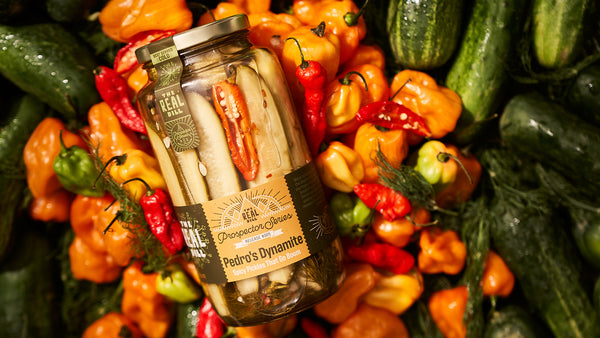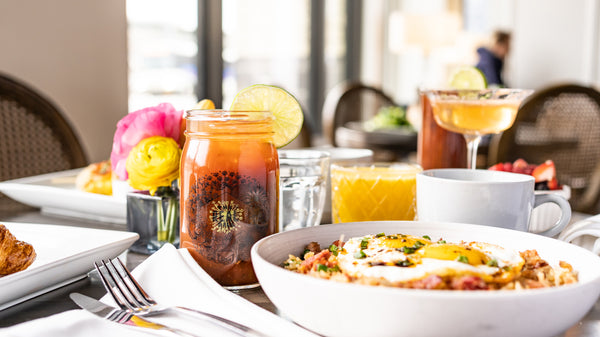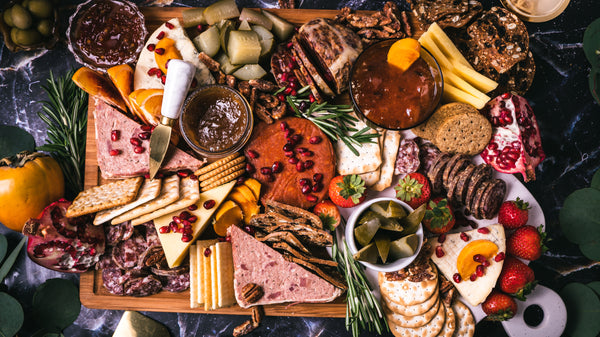How the Bloody Mary Got Its Name

Believe it or not, when we started The Real Dill, we had no intention of creating a Bloody Mary recipe. In fact, we consider it a happy accident that became our best selling product. Our pickling process results in a delicious, and refreshing cucumber-infused water, which, in the early days, we were throwing away. The overwhelming smell of fresh cucumbers made us feel guilty every time we disposed of it.
“Waste not, want not” is a proverb that we take to heart, and with that notion we decided the days of dumping this fragrant byproduct were over. Instead, we began experimenting with a Bloody Mary recipe that highlighted this cucumber-infused water as the star ingredient. What we did not know at the time is that people would eventually recognize us for our Bloody Mary Mix more than our pickles, causing us to joke that we are no longer just a pickle company, but a Bloody Mary company with a pickle problem!
Cucumber infused water, a byproduct of our pickling process, is the star ingredient in our now famed Bloody Mary Mix. Paired with generous amounts of horseradish, dill, garlic, and habaneros, we bottled the essence of your backyard garden, shattering the stigma that freshness can’t come in a jar. Unlike most mixes, ours only contains ten simple, high-quality ingredients bursting with bold, rich flavors. Bright, vivacious, and spirited, we set a new standard for what Bloody Marys can and should be.
Bloody Marys are now engrained in our company's fabric, and while this powerfully bold drink has been a staple on brunch menus for years, most of us are not privy to its origin story (including us). So we decided to take a deep dive into the history of the Bloody Mary to learn how this celebrated, healthy brunch libation rose to prominence.
The history of the Bloody Mary is as hazy as someone's memory after bottomless brunch. There are two origin myths, but cocktail historians typically agree that one story is more likely than the other.
While the origin of the name "Bloody Mary" and its recipe are debated, its birthplace is not. The most common backstory dates back to Paris in the 1920s at Harry's New York Bar. Harry's opened in 1911 after an American jockey had a New York bar disassembled and shipped to Paris. The New York-style bar became an American destination during the Prohibition era.
Around 1920, people who escaped the Russian Revolution arrived in Paris, bringing vodka with them, which was new to France. Ferdinand "Pete" Petiot, the bartender at Harry's, found this foreign spirit to be tasteless, as he began experimenting with it in his cocktail creations. At the same time, Petiot discovered American canned tomato juice, which in the alcohol-free days of Prohibition was called a "tomato juice cocktail" on bar and restaurant menus. After countless failed vodka cocktail experiments, Petiot finally combined vodka with American canned tomato juice and seasoning, and the rest is history.
After Prohibition ended, Petiot oversaw the King Cole Bar at the St. Regis Hotel in Manhattan. He brought his signature cocktail with him to New York City, giving it the name Red Snapper. Petiot reimagined the cocktail, adding in horseradish, Tabasco sauce, lemon juice, and celery salt to his base recipe. The new jazzed up version became an instant classic.
The name Bloody Mary has controversial beginnings. Many believe the Red Snapper was later labeled "Bloody Mary" after Queen Mary Tudor and her bloody reign against Protestants in England in the 1500s. Theorists claim that tomato juice represents the blood shed during this time and the fiery vodka illustrates Queen Mary Tudor's wicked means of executing her enemies. While the Queen Mary Tudor theory is plausible, there is another version of the origin story. An ad in the 1930s claimed the drink was named after a friend of entertainer George Jessel named Mary Geraghty.
Arguably one of the healthy cocktails on the menu, Bloody Marys are low calorie cocktails that pack a punch. In fact, the Bloody Mary is one of the most widely known cocktails in the world. While a bit divisive in nature, it seems as though people either love a Bloody Mary or hate Bloody Mary mix all together, everyone can agree that the Bloody Mary holds a superpower to cure the most vicious hangover.
If you search for "the best hangover cure" on the internet, people will tell you to drink a Bloody Mary. Traditional Bloody Marys can vary, but almost all consist of vodka, tomato juice, Worcestershire sauce, lemon juice, and Tabasco sauce. Bloody Marys contain the essential ingredients to battling the toughest morning after a long night of drinking. Tomato juice has a high concentration of the antioxidant lycopene, which helps to fight toxins found in your liver. It also contains key vitamins including Vitamin C. Worcestershire sauce is loaded with Vitamin B6 and Vitamin B3, which help your body convert carbs and fats into energy and further assist your liver in breaking down toxins. Lastly, lemon juice soothes your digestive tract and contains acids that cause your body to process healthy nutrients more slowly. While we hate to admit it, for the most efficient hangover cure, skip the booze. Not only will your body recover faster, but you will be able to sip on low calorie cocktails all morning without feeling any guilt. Plus, you can save the calories for balling out on toppings.
Over the past several years, brunch spots everywhere have been competing with each other to create the most decked out Bloody Mary concoctions. Each iteration seems to be crazier than the last. Gone are the days of a simple bamboo skewer of green olives, a lemon wedge, and a celery stalk. If your Bloody Mary doesn't have a meal stacked on top, how will it be Instagram-worthy? We have seen anything and everything ranging from conventional items such as celery, pickles, olives, lemon and lime wedges, bacon, and gourmet cheeses, to unconventional, over the top garnishes such as lobster tails, shrimp, crab claws, chicken wings, fried chicken, cheeseburger sliders, grilled cheese, slices of pizza, towers of tatter tots, onion rings, jerky, and waffles. Now, essentially a meal in itself, the Bloody Mary has gained an immense, cult-like popularity in the last several years, transforming it from a mid-morning hangover staple to a cocktail that is suitable for any time of the day and type of occasion.
If you are like us, you prefer the "hair of the dog" hangover remedy (extra booze, please!). One of our favorite things about Bloody Marys is their versatility. The Bloody Mary is not a spirit-forward drink, which means it is nearly impossible to mess it up. The tomato and vodka base make for a blank canvas, in which you can dress up as you see fit. You do not need to be a seasoned bartender to make a killer Bloody Mary. In fact, you can pour and mix your drink to taste without any specific measurements. Traditional vodka Bloody Marys are always a fan favorite, but one of our preferred Bloody Mary recipes uses gin in place of vodka. We also love to switch things up and add tequila to make the perfect Bloody Maria or our favorite beer to make an ice cold Michelada. We even have tried whiskey and it works beautifully in this cocktail.
Bloody Marys are flavorful and hearty, and while they make for the perfect cocktail to sip on at brunch or to cure a stubborn hangover, they are also a fan favorite when flying on airplanes. It is no surprise that this cocktail has reigned supreme for over a century. While the history of the Bloody Mary remains controversial, we are so grateful it was created for all of us to enjoy.
The Real Dill Signature Bloody Mary
- Rim glass with Bloody Mary Rimming Spice.
- Add ice to the glass.
- Combine vodka and Bloody Mary Mix over ice and stir.
-
Garnish with celery heart and The Real Dill pickle of your choice.
One of our favorite things to do with Bloody Mary Mix is to cook with it! Here are 10 Ways To Use Bloody Mary Mix That You're Not Expecting.
You can also check out all of our recipes here.




Ian Fairclough
January 31, 2026
From all that’s already been written, my conjecture is unlikely to be verifiable. Here goes: On First Avenue in NYC, lower east side, a bar operated by a Russian emigre named Vladimir. He concocted the cocktail and it acquired the moniker “Vladimiri”. The word was modified to its English-language form, “Bloody Mary.” Try saying Vladimiri, and note how easily it is changed to Bloody Mary!